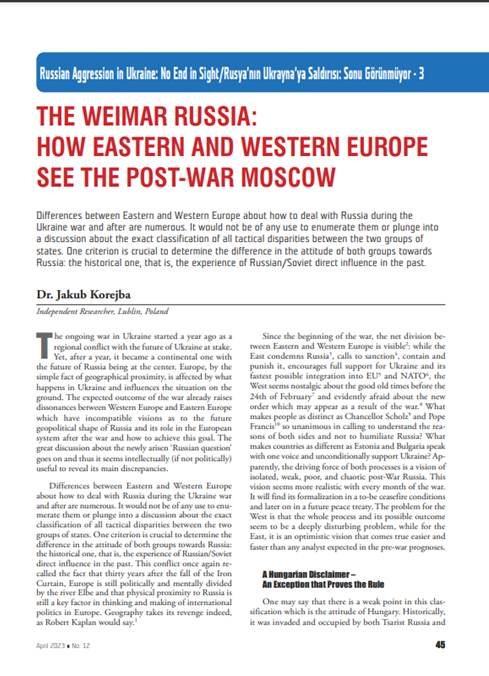
The Eurasian World Journal
Date of Publication: April 2023
Author: Dr. Jakub Korejba
The ongoing war in Ukraine started a year ago as a regional conflict with the future of Ukraine at stake. Yet, after a year, it became a continental one with the future of Russia being at the center. Europe, by the simple fact of geographical proximity, is affected by what happens in Ukraine and influences the situation on the ground. The expected outcome of the war already raises dissonances between Western Europe and Eastern Europe which have incompatible visions as to the future geopolitical shape of Russia and its role in the European system after the war and how to achieve this goal. The great discussion about the newly arisen ‘Russian question’ goes on and thus it seems intellectually (if not politically) useful to reveal its main discrepancies.
Differences between Eastern and Western Europe about how to deal with Russia during the Ukraine war and after are numerous. It would not be of any use to enumerate them or plunge into a discussion about the exact classification of all tactical disparities between the two groups of states. One criterion is crucial to determine the difference in the attitude of both groups towards Russia: the historical one, that is, the experience of Russian/Soviet direct influence in the past. This conflict once again recalled the fact that thirty years after the fall of the Iron Curtain, Europe is still politically and mentally divided by the river Elbe and that physical proximity to Russia is still a key factor in thinking and making of international politics in Europe. Geography takes its revenge indeed, as Robert Kaplan would say.
No comments yet.
-
25.01.2016
THE ARMENIAN QUESTION - BASIC KNOWLEDGE AND DOCUMENTATION -
12.06.2024
THE TRUTH WILL OUT -
27.03.2023
RADİKAL ERMENİ UNSURLARCA GERÇEKLEŞTİRİLEN MEZALİMLER VE VANDALİZM -
17.03.2023
PATRIOTISM PERVERTED -
23.02.2023
MEN ARE LIKE THAT -
03.02.2023
BAKÜ-TİFLİS-CEYHAN BORU HATTININ YAŞANAN TARİHİ -
16.12.2022
INTERNATIONAL SCHOLARS ON THE EVENTS OF 1915 -
07.12.2022
FAKE PHOTOS AND THE ARMENIAN PROPAGANDA -
07.12.2022
ERMENİ PROPAGANDASI VE SAHTE RESİMLER -
01.01.2022
A Letter From Japan - Strategically Mum: The Silence of the Armenians -
01.01.2022
Japonya'dan Bir Mektup - Stratejik Suskunluk: Ermenilerin Sessizliği -
03.06.2020
Anastas Mikoyan: Confessions of an Armenian Bolshevik -
08.04.2020
Sovyet Sonrası Ukrayna’da Devlet, Toplum ve Siyaset - Değişen Dinamikler, Dönüşen Kimlikler -
12.06.2018
Ermeni Sorunuyla İlgili İngiliz Belgeleri (1912-1923) - British Documents on Armenian Question (1912-1923) -
02.12.2016
Turkish-Russian Academics: A Historical Study on the Caucasus -
01.07.2016
Gürcistan'daki Müslüman Topluluklar: Azınlık Hakları, Kimlik, Siyaset -
10.03.2016
Armenian Diaspora: Diaspora, State and the Imagination of the Republic of Armenia -
24.01.2016
ERMENİ SORUNU - TEMEL BİLGİ VE BELGELER (2. BASKI)
-
AVİM Conference Hall 24.01.2023
CONFERENCE TITLED “HUNGARY’S PERSPECTIVES ON THE TURKIC WORLD"









